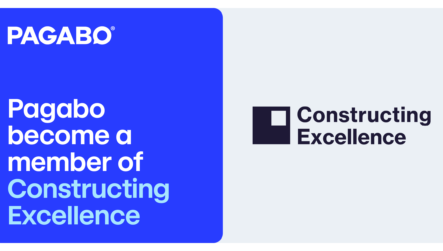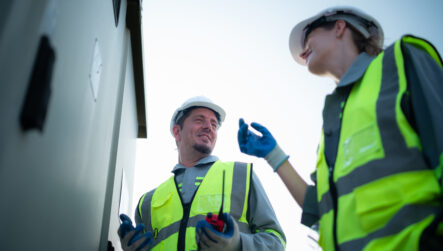
We returned to the UK Real Estate Infrastructure and Investment Forum (UKREiiF) in Leeds earlier this month to co-host ‘The Future of Social Value’ pavilion with our colleagues from Loop for a second year.
The second annual event was back with a bang, seeing attendance double from its inaugural year, and bringing thousands of people together for talks focusing on the future of the built environment. Our presence this year was largely underpinned by one question: How do we do better for us all?
Both inside our pavilion and out, the message was clear – social value is here to stay
Jason Stapley, our Chief Procurement Officer, said: “Operating for the good of the sector is an absolute core driver to how we operate at Pagabo. Making sure that the wider industry benefits from innovative and responsible practices, better skills and improved health and wellbeing are all just important to us as our day-to-day operations.
“That’s why we kicked off the week with the return of The Feelgood Games. The event saw more than 200 people coming together to take part in various physical activities to raise funds for mental health support in the sector, which we will reveal the running total for soon.
“Throughout the week, we hosted a number of talks focusing on this topic of how to drive the best for the overall industry, including a continued focus on wellbeing, along with what the future of procurement and best practice looks like. Meanwhile, several talks held in partnership with Loop put the topic of social value into the spotlight – and how this in turn drives betterment for all from society down to individuals.”
The Future of Procurement and the built environment industry
Procurement is not an episodic process. We’re now in a world on long-term relationships, not one-off contracts, which naturally lends itself well to social value too. Simply put, we can achieve more together over a sustained relationship than a single project – and in a way that really benefits the local community and people around any given scheme.
When it comes to the future of procurement, we spoke in detail about the move from a MEAT to a MAT approach – making sure that social value is fully embedded from the outset and throughout the process, being led on how we can achieve the very best outcomes.
The use of MMC is moving us into a new era here, but it needs to be driven by the right motivations and seek to deliver more energy efficient buildings to tackle the biggest challenge we face together in the climate crisis. It can also help us streamline processes, allowing us to redeploy talent to other areas, which could serve to support tackling the industry’s other major challenge – the skills gap.
Digitisation is a buzzword for the industry, but it really has a transformational power that must be embraced. Using the automotive sector as an example, many of the materials we now build cars from simply did not exist 10 to 20 years ago, yet in construction we are using the same materials – and in some cases processes – as we were decades ago.
We’re now in a time where technology – like Loop – can do the heavy lifting and heavy thinking for us and we need to embrace all the positives this can bring. Of course, this brings alignment with things like the Construction Playbook, but also plays into creating the gold standard in procurement and weaving the golden thread of information throughout building schemes.
A social value led approach to tenders
Our Head of Delivery, Karen Carter, discussed the importance of social value within the tender process – both when responding to tender questions, but also setting them too.
In many cases, social value is often considered too late in the process to be truly embedded, proving to be more of a reactive ‘bolt on’ to tenders. Particularly as bids now place more weighting on social value it’s critical to make sure that the tender documents and questions are crafted in such a way that allow suppliers to address this area properly.
While monetisation and measurement of social value – along with the importance of tailoring this – was covered by the experts from Loop, the importance of stakeholder engagement was placed at the heart of the discussion. Whether it’s engaging with potential scheme end-users or working with clients to identify what certain aspects like job or employment plans actually need to achieve, examining the human impact of our actions must be the heart.
Social value has come a long way in the ten years since the Social Value Act, and it is continuing to develop as more clients and suppliers continue on their journeys of understanding and implementation.
Mental health and wellbeing
As well as the Pagabo Foundation hosting the Feelgood Games, we also placed a focus on the importance of improving wellbeing within the construction industry, which has a longstanding problem of higher-than-average suicide rates.
With employers having a moral responsibility for staff wellbeing, our head of innovation Charley Wainwright took to the pavilion stage to discuss the various impacts and considerations. The importance of company culture was central, driving the point that a positive and open connection between employer and employee is needed to provide proper support.
Making construction an overall nicer, more open and caring industry will play into the recruitment and retention of the talent needed to take us into the future. With remote working and a variety of pressures on different types of roles across the sector, this is a topic that will continue to take a central position – and we will be revealing more about our operations in this space in the near future.
To stay up to date with all our latest news, sign up to our mailing list by hitting the subscribe button below!
Discover our frameworks
















































































